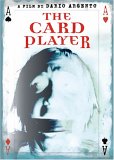| Reviews & Columns |
|
Reviews DVD TV on DVD Blu-ray 4K UHD International DVDs In Theaters Reviews by Studio Video Games Features Collector Series DVDs Easter Egg Database Interviews DVD Talk Radio Feature Articles Columns Anime Talk DVD Savant Horror DVDs The M.O.D. Squad Art House HD Talk Silent DVD
|
DVD Talk Forum |
|
|
| Resources |
|
DVD Price Search Customer Service #'s RCE Info Links |
|
Columns
|
|
|
Card Player, The
Starz / Anchor Bay // Unrated // August 23, 2005
List Price: $19.98 [Buy now and save at Amazon]
Dario Argento will never be able to escape the spectre of his past successes; every film he makes will inevitably be compared by critics and his ardent fans to 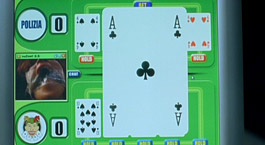 the likes of Inferno, Suspiria, and Tenebre. Argento's most recent feature film, The Card Player (Il Cartaio), isn't a masterpiece on that level, and it's not a movie that will be reverently studied for decades to come. Still, I found The Card Player to be a decent thriller, regardless of where it's considered to fall in the director's filmography.
the likes of Inferno, Suspiria, and Tenebre. Argento's most recent feature film, The Card Player (Il Cartaio), isn't a masterpiece on that level, and it's not a movie that will be reverently studied for decades to come. Still, I found The Card Player to be a decent thriller, regardless of where it's considered to fall in the director's filmography.
Young women are being kidnapped throughout Rome, and the madman holding them hostage isn't seeking money or trying to make some sort of political statement. No, he just wants to play a game of online poker with the police. Win three hands out of five, and she's set free. Lose, and she dies. For each hand lost, something will be amputated. The authorities are reluctant to play along, but after the first corpse washes ashore, detective Anna Mari (Stefania Rocca) and British forensics expert John Brennan (Dog Soldiers' Liam Cunningham) set out to stop his reign of terror. Of course, the killer is the one holding all of the cards...
I know I shouldn't like The Card Player. The premise is ridiculous. The way the mystery unfolds and many of the set pieces that are used make the movie feel as if it should be sandwiched between The Crow 2: City of Angels and Out for Justice on a Thursday night on HBO Zone. The movie grabs a variety of stock plot points off the shelf, from the tortured female cop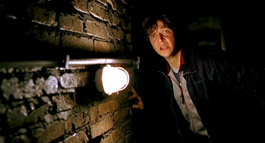 who's attacked while alone in her home to the disgraced, drunken detective seeking redemption to the cop who stumbles onto the killer's hideout but doesn't bother to call for backup to the movie's absurdly over-the-top finale. Some of the line readings from the supporting cast are painful, and I'm not sure what compelled Argento to tack on such a brief, pointless epilogue (at least it's not one of those one-last-scare shots).
who's attacked while alone in her home to the disgraced, drunken detective seeking redemption to the cop who stumbles onto the killer's hideout but doesn't bother to call for backup to the movie's absurdly over-the-top finale. Some of the line readings from the supporting cast are painful, and I'm not sure what compelled Argento to tack on such a brief, pointless epilogue (at least it's not one of those one-last-scare shots).
That's a fairly long list of complaints, and I could keep going if I felt motivated. I don't, though; The Card Player may not be particularly inventive, and it doesn't have the same visual flair as Argento's earlier works. I can't logically make any sense of why I feel this way, but I greatly enjoyed The Card Player. It does an effective job maintaining tension throughout, and even though a poker interface that requires the user to click on each individual card to see what he's holding should be grating, I could feel my pulse quicken with the turn of each card. The juxtaposition of the muted screams with the goofy game graphics and its tinny MIDI music teeters on darkly comedic. The tight shots of the victims' faces on the webcam as the killer flashes a box cutter in front of their terrified eyes made me cringe -- in a good way -- even though the movie's almost entirely devoid of gore. The most graphic imagery in the movie is post-mortem, and Argento unflinchingly documents the examination of the killer's nude, waterlogged victims. As many times as I've seen similar shots in other movies, the poking around in lifeless, mutilated corpses is still unsettling.
Argento also tries something different with the murders in this movie. There are usually extended stalk sequences in his gialli, but in The Card Player, there are no P.O.V. shots from the killer's perspective, and Argento's trademark black gloves are only briefly seen. The audience almost never sees anything that the protagonists aren't seeing, and I think that contributes to the tension. His films typically have a murderer that hardly anyone would've guessed from the outset. The Card Player takes a more American approach, and if you're up on Roger Ebert's Law of Economy of Characters, you'll be able to figure out the "who" (though not the "how" or the "why") with very little effort. There's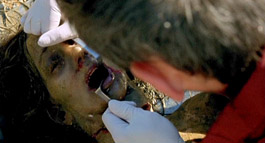 virtually no on-screen gore, but having a girl screaming through her gag on a fuzzy webcam after a box cutter disappears from view...not knowing the extent of what's going on, other than that she's being butchered...is far more effective than I would've thought. The Card Player may not fit the expected definition of a 'good movie', but at least it's an entertaining one.
virtually no on-screen gore, but having a girl screaming through her gag on a fuzzy webcam after a box cutter disappears from view...not knowing the extent of what's going on, other than that she's being butchered...is far more effective than I would've thought. The Card Player may not fit the expected definition of a 'good movie', but at least it's an entertaining one.
Argento's most recent films haven't gotten particularly stellar treatment on DVD stateside. Sleepless and The Stendhal Syndrome were both cropped, and the transfers were wretched even if they'd been presented properly. The Phantom of the Opera was a PAL conversion, and none of the three were graced with any worthwhile extras. Anchor Bay has done a much more respectable job bringing The Card Player to American audiences, compiling an impressive assortment of supplemental material and presenting the movie in its original aspect ratio.
Video: The 1.85:1 anamorphic widescreen video is fine, at least with my particular home theater setup. Other readers' mileage may vary, and I'll explain why in a moment. Its colors appear to be accurately rendered, with the interiors in the police station bathed in a cold blue that strikes me as a very appropriate fit for the tone of those scenes. The source material's expectedly clean; there's a bit of film grain, but nothing unexpected or inappropriate. Detail and clarity both seem alright, although some scenes more than others look like they've been oversharpened. Fairly average overall.
Like Trauma, The Card Player apparently hasn't been properly flagged for progressive scan players. It all depends on how your TV or DVD player deinterlaces -- if it's flag-based, the movie can be pretty painful to watch. The deinterlacer in my HDTV didn't seem to have a problem with it, but still...caveat emptor.
Audio: With so much of the movie taking place in front of a desktop computer, it's little surprise that the Dolby Digital 5.1 audio (448Kbps) is often tethered towards the front.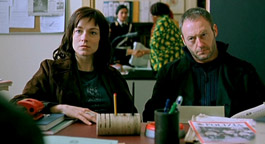 The majority of the surround activity comes courtesy of the electronic score by longtime Argento collaborator Claudio Simonetti, along with some light ambiance. Aside from the score, the six-channel setup is most noticeable in exteriors, such as when Anna steps outside to confront a stalker -- the sound of wind rustling through the leaves fills the soundstage, and the accompanying music summons a hellish amount of bass. The film's dialogue also comes through crisply and cleanly. It's not a particularly aggressive mix, but I can't muster any complaints. An English stereo track is also offered, and although there are no subtitles, the DVD is closed captioned.
The majority of the surround activity comes courtesy of the electronic score by longtime Argento collaborator Claudio Simonetti, along with some light ambiance. Aside from the score, the six-channel setup is most noticeable in exteriors, such as when Anna steps outside to confront a stalker -- the sound of wind rustling through the leaves fills the soundstage, and the accompanying music summons a hellish amount of bass. The film's dialogue also comes through crisply and cleanly. It's not a particularly aggressive mix, but I can't muster any complaints. An English stereo track is also offered, and although there are no subtitles, the DVD is closed captioned.
Supplements: The Card Player features another audio commentary by Alan Jones, the author of Profondo Argento. Jones spent a couple of weeks on the set of the film and has quite a bit to say about it. He doesn't just talk about the movie but also the environment surrounding it -- the Italian success of Sleepless that compelled Argento to quickly produce a follow-up, how the project he'd originally eyed had stalled, and how in Italy, winter is the equivalent to the American summer blockbuster season. I also enjoyed hearing about what could have been -- the movie was originally envisioned as a sequel to The Stendhal Syndrome, several different endings (including different characters being revealed as the killer) were written, the movie was originally slated to take place in Venice, and actors like Mathieu Kassovitz, Vincent Cassel, and Asia Argento were originally considered. Jones speaks at length about the cast as well as Argento allowing them to improvise more freely than he ever had before, along with notes like callbacks to The Bird with the Crystal Plumage and homages to Fritz Lang's Dr. Mabuse, der Spieler. This track is a touch less talkative than his commentary for Trauma; there are a couple of lengthy pauses, and there are a few spots where Jones just seems to be describing the action on-screen. Not quite as compelling as the track on the simultaneously released Trauma DVD but still very deserving of a listen.
The twelve minute "Playing with Death" featurette interviews Dario Argento, who opens with comments on poker serving as a metaphor for life as well as noting the depth of the research he did for The Card Player. He speaks at length about its cast and the movie's cinematography, and Argento also discusses the way he mentally approaches filmmaking. As with the similar clip on the Trauma DVD, I really enjoyed this interview, and if it had been twice as long, I'm sure I'd still wonder why it was so short.
"Maestro of Fear" spends sixteen minutes with composer Claudio Simonetti. It begins with the usual background info -- Simonetti's relationship with horror and how he first got involved with music -- but most of it's spend on his years with Goblin and Argento. He notes how his group first became associated with the director, along with why Goblin split and what the process of working with Argento is typically like.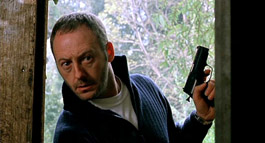 He also comments on The Card Player specifically and how unusual it was to compose the score while the movie was shooting rather than writing the music afterwards. It's a good interview, and hopefully further excerpts will appear on future Anchor Bay releases.
He also comments on The Card Player specifically and how unusual it was to compose the score while the movie was shooting rather than writing the music afterwards. It's a good interview, and hopefully further excerpts will appear on future Anchor Bay releases.
There are two collections of behind-the-scenes footage, one of which is a nine minute montage ambiguously labeled "Promo". The second runs five and a half minutes and features some brief comments from Argento about the project. Rounding out the extras are a Dario Argento bio, a two minute anamorphic widescreen trailer, and plugs for other Argento-related releases from Anchor Bay.
The DVD is packaged with a set of liner notes listing the disc's sixteen chapter stops along with quoting from an Argento interview with La Repubblica. The disc also features a set of lightly animated 16x9 menus.
Conclusion: No, The Card Player is not one of the more memorable films to be helmed by Dario Argento. As difficult as it may be to ignore its directorial credit, readers who focus on the movie as The Card Player and not Dario Argento's The Card Player may walk away with the same opinion I have -- that it's an entertaining and effective thriller, if not a particularly remarkable one. Good but not great, although I enjoyed both the movie and its supplemental material enough to recommend this DVD. Recommended.
 the likes of Inferno, Suspiria, and Tenebre. Argento's most recent feature film, The Card Player (Il Cartaio), isn't a masterpiece on that level, and it's not a movie that will be reverently studied for decades to come. Still, I found The Card Player to be a decent thriller, regardless of where it's considered to fall in the director's filmography.
the likes of Inferno, Suspiria, and Tenebre. Argento's most recent feature film, The Card Player (Il Cartaio), isn't a masterpiece on that level, and it's not a movie that will be reverently studied for decades to come. Still, I found The Card Player to be a decent thriller, regardless of where it's considered to fall in the director's filmography. Young women are being kidnapped throughout Rome, and the madman holding them hostage isn't seeking money or trying to make some sort of political statement. No, he just wants to play a game of online poker with the police. Win three hands out of five, and she's set free. Lose, and she dies. For each hand lost, something will be amputated. The authorities are reluctant to play along, but after the first corpse washes ashore, detective Anna Mari (Stefania Rocca) and British forensics expert John Brennan (Dog Soldiers' Liam Cunningham) set out to stop his reign of terror. Of course, the killer is the one holding all of the cards...
I know I shouldn't like The Card Player. The premise is ridiculous. The way the mystery unfolds and many of the set pieces that are used make the movie feel as if it should be sandwiched between The Crow 2: City of Angels and Out for Justice on a Thursday night on HBO Zone. The movie grabs a variety of stock plot points off the shelf, from the tortured female cop
 who's attacked while alone in her home to the disgraced, drunken detective seeking redemption to the cop who stumbles onto the killer's hideout but doesn't bother to call for backup to the movie's absurdly over-the-top finale. Some of the line readings from the supporting cast are painful, and I'm not sure what compelled Argento to tack on such a brief, pointless epilogue (at least it's not one of those one-last-scare shots).
who's attacked while alone in her home to the disgraced, drunken detective seeking redemption to the cop who stumbles onto the killer's hideout but doesn't bother to call for backup to the movie's absurdly over-the-top finale. Some of the line readings from the supporting cast are painful, and I'm not sure what compelled Argento to tack on such a brief, pointless epilogue (at least it's not one of those one-last-scare shots). That's a fairly long list of complaints, and I could keep going if I felt motivated. I don't, though; The Card Player may not be particularly inventive, and it doesn't have the same visual flair as Argento's earlier works. I can't logically make any sense of why I feel this way, but I greatly enjoyed The Card Player. It does an effective job maintaining tension throughout, and even though a poker interface that requires the user to click on each individual card to see what he's holding should be grating, I could feel my pulse quicken with the turn of each card. The juxtaposition of the muted screams with the goofy game graphics and its tinny MIDI music teeters on darkly comedic. The tight shots of the victims' faces on the webcam as the killer flashes a box cutter in front of their terrified eyes made me cringe -- in a good way -- even though the movie's almost entirely devoid of gore. The most graphic imagery in the movie is post-mortem, and Argento unflinchingly documents the examination of the killer's nude, waterlogged victims. As many times as I've seen similar shots in other movies, the poking around in lifeless, mutilated corpses is still unsettling.
Argento also tries something different with the murders in this movie. There are usually extended stalk sequences in his gialli, but in The Card Player, there are no P.O.V. shots from the killer's perspective, and Argento's trademark black gloves are only briefly seen. The audience almost never sees anything that the protagonists aren't seeing, and I think that contributes to the tension. His films typically have a murderer that hardly anyone would've guessed from the outset. The Card Player takes a more American approach, and if you're up on Roger Ebert's Law of Economy of Characters, you'll be able to figure out the "who" (though not the "how" or the "why") with very little effort. There's
 virtually no on-screen gore, but having a girl screaming through her gag on a fuzzy webcam after a box cutter disappears from view...not knowing the extent of what's going on, other than that she's being butchered...is far more effective than I would've thought. The Card Player may not fit the expected definition of a 'good movie', but at least it's an entertaining one.
virtually no on-screen gore, but having a girl screaming through her gag on a fuzzy webcam after a box cutter disappears from view...not knowing the extent of what's going on, other than that she's being butchered...is far more effective than I would've thought. The Card Player may not fit the expected definition of a 'good movie', but at least it's an entertaining one. Argento's most recent films haven't gotten particularly stellar treatment on DVD stateside. Sleepless and The Stendhal Syndrome were both cropped, and the transfers were wretched even if they'd been presented properly. The Phantom of the Opera was a PAL conversion, and none of the three were graced with any worthwhile extras. Anchor Bay has done a much more respectable job bringing The Card Player to American audiences, compiling an impressive assortment of supplemental material and presenting the movie in its original aspect ratio.
Video: The 1.85:1 anamorphic widescreen video is fine, at least with my particular home theater setup. Other readers' mileage may vary, and I'll explain why in a moment. Its colors appear to be accurately rendered, with the interiors in the police station bathed in a cold blue that strikes me as a very appropriate fit for the tone of those scenes. The source material's expectedly clean; there's a bit of film grain, but nothing unexpected or inappropriate. Detail and clarity both seem alright, although some scenes more than others look like they've been oversharpened. Fairly average overall.
Like Trauma, The Card Player apparently hasn't been properly flagged for progressive scan players. It all depends on how your TV or DVD player deinterlaces -- if it's flag-based, the movie can be pretty painful to watch. The deinterlacer in my HDTV didn't seem to have a problem with it, but still...caveat emptor.
Audio: With so much of the movie taking place in front of a desktop computer, it's little surprise that the Dolby Digital 5.1 audio (448Kbps) is often tethered towards the front.
 The majority of the surround activity comes courtesy of the electronic score by longtime Argento collaborator Claudio Simonetti, along with some light ambiance. Aside from the score, the six-channel setup is most noticeable in exteriors, such as when Anna steps outside to confront a stalker -- the sound of wind rustling through the leaves fills the soundstage, and the accompanying music summons a hellish amount of bass. The film's dialogue also comes through crisply and cleanly. It's not a particularly aggressive mix, but I can't muster any complaints. An English stereo track is also offered, and although there are no subtitles, the DVD is closed captioned.
The majority of the surround activity comes courtesy of the electronic score by longtime Argento collaborator Claudio Simonetti, along with some light ambiance. Aside from the score, the six-channel setup is most noticeable in exteriors, such as when Anna steps outside to confront a stalker -- the sound of wind rustling through the leaves fills the soundstage, and the accompanying music summons a hellish amount of bass. The film's dialogue also comes through crisply and cleanly. It's not a particularly aggressive mix, but I can't muster any complaints. An English stereo track is also offered, and although there are no subtitles, the DVD is closed captioned. Supplements: The Card Player features another audio commentary by Alan Jones, the author of Profondo Argento. Jones spent a couple of weeks on the set of the film and has quite a bit to say about it. He doesn't just talk about the movie but also the environment surrounding it -- the Italian success of Sleepless that compelled Argento to quickly produce a follow-up, how the project he'd originally eyed had stalled, and how in Italy, winter is the equivalent to the American summer blockbuster season. I also enjoyed hearing about what could have been -- the movie was originally envisioned as a sequel to The Stendhal Syndrome, several different endings (including different characters being revealed as the killer) were written, the movie was originally slated to take place in Venice, and actors like Mathieu Kassovitz, Vincent Cassel, and Asia Argento were originally considered. Jones speaks at length about the cast as well as Argento allowing them to improvise more freely than he ever had before, along with notes like callbacks to The Bird with the Crystal Plumage and homages to Fritz Lang's Dr. Mabuse, der Spieler. This track is a touch less talkative than his commentary for Trauma; there are a couple of lengthy pauses, and there are a few spots where Jones just seems to be describing the action on-screen. Not quite as compelling as the track on the simultaneously released Trauma DVD but still very deserving of a listen.
The twelve minute "Playing with Death" featurette interviews Dario Argento, who opens with comments on poker serving as a metaphor for life as well as noting the depth of the research he did for The Card Player. He speaks at length about its cast and the movie's cinematography, and Argento also discusses the way he mentally approaches filmmaking. As with the similar clip on the Trauma DVD, I really enjoyed this interview, and if it had been twice as long, I'm sure I'd still wonder why it was so short.
"Maestro of Fear" spends sixteen minutes with composer Claudio Simonetti. It begins with the usual background info -- Simonetti's relationship with horror and how he first got involved with music -- but most of it's spend on his years with Goblin and Argento. He notes how his group first became associated with the director, along with why Goblin split and what the process of working with Argento is typically like.
 He also comments on The Card Player specifically and how unusual it was to compose the score while the movie was shooting rather than writing the music afterwards. It's a good interview, and hopefully further excerpts will appear on future Anchor Bay releases.
He also comments on The Card Player specifically and how unusual it was to compose the score while the movie was shooting rather than writing the music afterwards. It's a good interview, and hopefully further excerpts will appear on future Anchor Bay releases. There are two collections of behind-the-scenes footage, one of which is a nine minute montage ambiguously labeled "Promo". The second runs five and a half minutes and features some brief comments from Argento about the project. Rounding out the extras are a Dario Argento bio, a two minute anamorphic widescreen trailer, and plugs for other Argento-related releases from Anchor Bay.
The DVD is packaged with a set of liner notes listing the disc's sixteen chapter stops along with quoting from an Argento interview with La Repubblica. The disc also features a set of lightly animated 16x9 menus.
Conclusion: No, The Card Player is not one of the more memorable films to be helmed by Dario Argento. As difficult as it may be to ignore its directorial credit, readers who focus on the movie as The Card Player and not Dario Argento's The Card Player may walk away with the same opinion I have -- that it's an entertaining and effective thriller, if not a particularly remarkable one. Good but not great, although I enjoyed both the movie and its supplemental material enough to recommend this DVD. Recommended.
|
| Popular Reviews |
| Sponsored Links |
|
|
| Sponsored Links |
|
|
| Release List | Reviews | Shop | Newsletter | Forum | DVD Giveaways | Blu-Ray | Advertise |
|
Copyright 2024 DVDTalk.com All Rights Reserved. Legal Info, Privacy Policy, Terms of Use,
Manage Preferences,
Your Privacy Choices | |||||||









